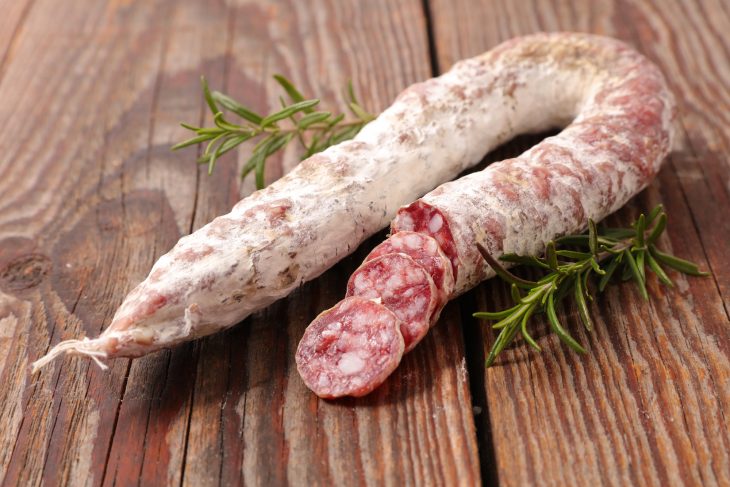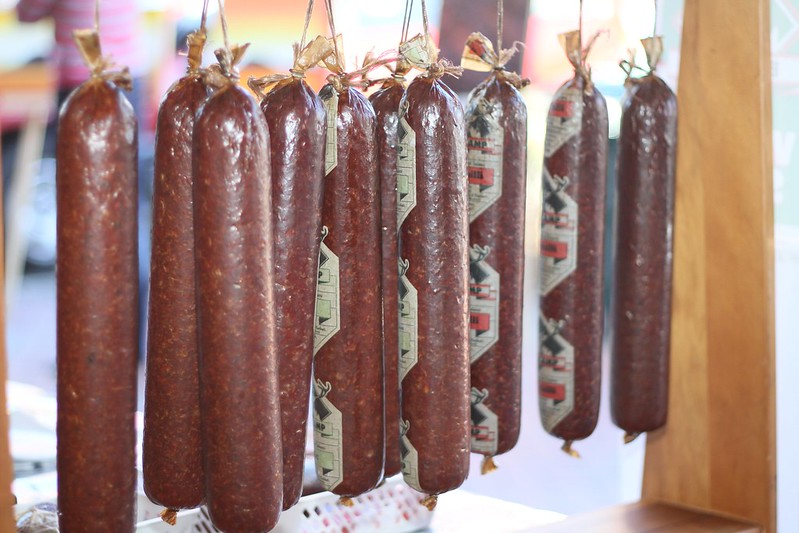
Salami, a delicious cured meat that originated in Italy, has gained popularity worldwide for its unique taste and versatility. Whether enjoyed on its own, incorporated into sandwiches, or added to various dishes, salami adds a flavorful punch to any meal. But beyond its culinary appeal, have you ever wondered about the nutritional value of this cured delicacy? In this article, we will explore salami nutrition facts, shedding light on its composition, health benefits, and considerations for incorporating it into a balanced diet.
Salami: A Brief Introduction
Salami is a type of cured sausage made from ground meat, typically pork, mixed with various seasonings, spices, and herbs. The meat is fermented and then air-dried, resulting in a rich flavor and firm texture. The exact ingredients and production methods can vary, leading to different variations of salami with their own unique characteristics.
Caloric Content
Salami is a relatively calorie-dense food due to its high fat content. A 1-ounce (28 grams) serving of salami provides approximately 130-150 calories.
Protein Content
Salami is a good source of protein, with each serving containing around 5-6 grams. Protein is an essential macronutrient that plays a crucial role in building and repairing tissues, supporting immune function, and providing a source of energy. Salami contains a notable amount of protein, making it a convenient option for individuals looking to meet their daily protein requirements.

Fat Content
The fat content in salami is predominantly derived from animal sources. While fat contributes to the distinct taste and texture of salami, it’s important to consume it in moderation due to its high calorie content. Approximately 80-90% of the calories in salami come from fat, with saturated fats being the primary type.
Iron
Salami is a decent source of iron, an essential mineral that plays a vital role in oxygen transport and energy production in the body. Consuming iron-rich foods like salami can help prevent iron deficiency anemia.
Zinc
Salami also contains zinc, a mineral that supports immune function, cell growth, and wound healing. Zinc is involved in numerous enzymatic reactions and contributes to overall well-being.
Vitamin B12
Salami is a good source of vitamin B12, a crucial nutrient for the formation of red blood cells and proper neurological function. Adequate intake of vitamin B12 is particularly important for individuals following vegetarian or vegan diets, as it is predominantly found in animal products.
Sodium Content
One significant consideration when consuming salami is its high sodium content. Salami is a processed meat, and as such, it often contains higher levels of sodium compared to unprocessed meats. Excessive sodium intake can contribute to high blood pressure and increase the risk of cardiovascular problems. Therefore, moderation is key when incorporating salami into your diet, especially if you have a preexisting medical condition or are on a sodium-restricted diet.
Flavorful Alternative for Low-Carb Diets
For individuals following low-carb or ketogenic diets, finding satisfying and flavorful food options can be challenging. Salami can serve as an excellent choice, providing a rich taste while being low in carbohydrates. It can be a convenient snack or ingredient for those looking to reduce their carbohydrate intake.
Processed Meat and Cancer Risk
The World Health Organization (WHO) has classified processed meats, including salami, as a Group 1 carcinogen, meaning there is sufficient evidence to link their consumption to an increased risk of certain cancers. It is important to balance your intake of processed meats with other healthier protein sources and prioritize a diverse and balanced diet.

Allergies and Sensitivities
Salami typically contains ingredients such as spices, herbs, and sometimes additives. If you have any allergies or sensitivities to these components, it’s crucial to read the ingredient labels carefully or consult with a healthcare professional to ensure your safety.
Conclusion
Salami, with its rich flavor and cultural heritage, can be a delightful addition to your meals or a satisfying snack. While it offers some nutritional benefits, it’s important to consume salami in moderation due to its high fat and sodium content. Incorporating it into a balanced diet that includes a variety of nutrient-dense foods can help you enjoy its unique taste while prioritizing your health. Remember to read labels, choose lower-sodium options when available, and consult with a healthcare professional if you have specific dietary concerns or restrictions.
Frequently Asked Questions (FAQs)
Is salami gluten-free?
Salami itself is usually gluten-free since it is made from meat and spices. However, some brands may add gluten-containing ingredients or process salami in facilities that handle gluten. To be certain, it’s essential to check the packaging or contact the manufacturer for gluten-free certification.
Can I freeze salami?
Yes, salami can be frozen. It is recommended to wrap it tightly in plastic wrap or place it in an airtight container before freezing. When thawed, the texture and taste may be slightly affected, but it should still be safe to consume.
How long does salami last?
The shelf life of salami depends on various factors such as the type of salami, packaging, and storage conditions. Typically, unopened salami can last for several weeks in the refrigerator. Once opened, it is best consumed within a week or as indicated on the packaging.
Can I include salami in a balanced diet?
Salami can be part of a balanced diet when consumed in moderation. It is important to consider its high sodium content and potential risks associated with processed meats. Balancing your intake with other nutrient-dense foods is key to maintaining a healthy and varied diet.
Are there healthier alternatives to salami?
If you are looking for healthier alternatives to salami, you can consider leaner cuts of unprocessed meats such as turkey, chicken, or lean beef. These options provide protein without the high sodium and fat content often found in salami.
Was this page helpful?
Our commitment to delivering trustworthy and engaging content is at the heart of what we do. Each fact on our site is contributed by real users like you, bringing a wealth of diverse insights and information. To ensure the highest standards of accuracy and reliability, our dedicated editors meticulously review each submission. This process guarantees that the facts we share are not only fascinating but also credible. Trust in our commitment to quality and authenticity as you explore and learn with us.


